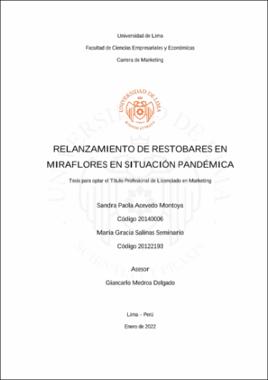Relanzamiento de restobares en Miraflores en situación pandémica

Ver/
Tesis
(application/pdf: 2.544Mb)
(application/pdf: 2.544Mb)
Autorización
(application/pdf: 142.3Kb)
(application/pdf: 142.3Kb)
Autorización
(application/pdf: 42.58Kb)
(application/pdf: 42.58Kb)
Reporte de similitud
(application/pdf: 35.42Mb)
(application/pdf: 35.42Mb)
Fecha
2022Asesor(es)
Metadatos
Mostrar el registro completo del ítemResumen
Since March 2020, Peru has been in a state of national health emergency because of the COVID-19 pandemic. This caused a paralyzation of commercial activities, including the restaurant and restobar sector. This had an impact on consumer behavior and experience, generating a new dynamic in the market and leading companies to redefine their activities, taking into account the new measures dictated by the government and the demands of the context. Subsequently, after the national vaccination process, the restriction of these measures become more relaxed, among them: curfews, limited room capacity, table distancing, biosecurity protocols and the use of masks. The problem of the present research is framed in the search for the minimum requirements that a restobar must meet to offer an adequate experience, taking into account the new normality of the pandemic. In turn, the general objective is to determine the essential conditions for a customer to place an order in a restobar in Miraflores, in the COVID-19 situation. The study variables were the impact of Covid-19 on the attendance of a restobar, the level of service quality and the level of post-sales satisfaction.The methodology used is mixed, the first part being qualitative research measured through three focus groups. Then, with the insights gathered, a survey was applied to the target audience: men and women between 18 and 45 years of age from social economic status ABC, who live in Lima and whose frequency of visit is at least once a month to restobars in general in the context of pandemic and on the other hand, who attend restobars in Miraflores without a specific frequency. The main findings are that the client expects a restobar in Miraflores to communicate measures to counteract COVID-19 such as distributing tables, taking into account a considerable distance, having open spaces such as terraces and complying with biosecurity measures. On the other hand, the staff is expected to be friendly, efficient in
their service and to communicate the promotions of the premises. It is important to consider that consumers value having a differentiated theme. Regarding after-sales service and delivery, it was identified that they are not relevant for the public studied, since problems are solved in the same store. In addition, conflicting opinions were found regarding delivery, i.e. one group thought that it was a good alternative to avoid Desde marzo del 2020, en el Perú se activó un estado de emergencia sanitaria a nivel nacional, producto de la pandemia COVID-19. Este hecho ocasionó una paralización de las actividades comerciales incluyendo el sector restaurantes y restobares. Esto impactó en el comportamiento del consumidor y su experiencia, generando una nueva dinámica en el mercado y llevando a las empresas a redefinir sus actividades, tomando en cuentan las nuevas medidas dictadas por el gobierno y la exigencia del contexto. Posteriormente, tras el proceso nacional de vacunación, la restricción de estas medidas fue más holgada, entre ellas: toques de queda, aforo límite del local, distanciamiento de mesas, protocolos de bioseguridad y uso de mascarillas. La problemática de la presente investigación se enmarca en la búsqueda de los requisitos mínimos que debe reunir un restobar para ofrecer una experiencia adecuada, tomando en cuenta la nueva normalidad de la pandemia. A su vez, el objetivo general es determinar las condiciones esenciales para que un cliente realice un pedido a un restobar de Miraflores, en coyuntura COVID-19. Se tomaron como variables de estudio el impacto del Covid-19 en la asistencia un restobar, el nivel de calidad de servicio y el nivel de satisfacción post-venta. La metodología empleada es mixta, siendo la primera parte, la investigación cualitativa medida a través de tres focus groups. Seguidamente, con los insights recabados, se aplicó una encuesta dirigida al público objetivo: hombres y mujeres de 18 a 45 años de NSE A, B y C, que vivan en Lima y cuya frecuencia de visita sea al menos de una vez al mes a restobares en general en contexto de pandemia y por otro lado, que asistan a restobares a Miraflores sin una frecuencia específica. Los principales hallazgos son que el cliente espera que un restobar en Miraflores comunique las medidas para contrarrestar la COVID-19 como distribuir las mesas, tomando en cuenta una distancia considerable, teniendo espacios abiertos como terrazas y cumpliendo con las medidas de bioseguridad. Por otro lado, el personal se espera que sea amable, eficaz en su atención y comunique las promociones del local. Es importante considerar que los consumidores valoran mucho contar con una temática diferenciada. Respecto al servicio post venta y delivery, se identificó que no son relevantes para el público estudiado, ya que los problemas se solucionan en ese mismo local. Además, se descubrió opiniones encontradas respecto al delivery, es decir un grupo opinaba que era una buena alternativa para evitar contagios; mientras que el otro consideraba que la experiencia no sería la misma y que las bebidas no serían inocuas.
Cómo citar
Acevedo Montoya, S. P. & Salinas Seminario, M. G. (2022) Relanzamiento de restobares en Miraflores en situación pandémica [Tesis para optar el Título Profesional de Licenciado en Marketing, Universidad de Lima]. Repositorio institucional de la Universidad de Lima. https://hdl.handle.net/20.500.12724/16794Editor
Universidad de LimaTemas
Coleccion(es)
- Tesis [86]
El ítem tiene asociados los siguientes ficheros de licencia:

